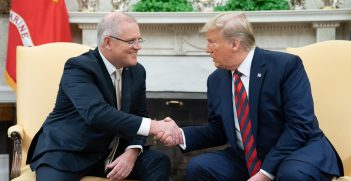Sexual and Reproductive Health is a Security Issue for Southeast Asia

For young women in Southeast Asia, the journey to democratic freedom begins with bodily autonomy and the power to take control of their own sexual and reproductive health. Donor countries and aid organisations must focus on providing adequate education in these areas.
Promoting health and wellbeing among young women is a security issue for Southeast Asia due to an immediate need to bridge health inequalities in the region. This is especially the case amongst displaced populations and those trapped in cycles of poverty and gender discrimination. The neglect of sexual and reproductive health constitutes a significant human rights violation. For young women and girls, sexual and reproductive health is a building block for further developing their capabilities and in accessing education and livelihood.
The overall demographic trend in Asia, particularly East Asian countries, is an aging population. Southeast Asia, however, is bucking this trend. In Cambodia, approximately 60 percent of the population is under the age of 30. In the Philippines and Indonesia – two of the most populous countries in the region – young people comprise 17 percent of the population, with an estimated 60 million youth in these two countries alone. Young people will take the helm of leadership and participation across all sectors of society. Cultivating opportunities for young people’s participation and leadership is crucial in the face of future predictions of severe disasters, protracted internal conflicts and ongoing political repression.
Young people are prevented from pursuing their potential when they face barriers to basic self-governance in matters of sexual and reproductive health. Data from UNFPA indicates that, although globally adolescent birth rates are on the decline, this is not the case in Southeast Asia. High adolescent birth rates are found in Cambodia, Indonesia and the Philippines. When young people have children it typically involves early marriage, which is especially prevalent in the region where tradition and religion place great importance on family. The UNFPA points out that addressing these issues is a “matter of urgency” because they “represent significant challenges to young persons’ rights and sustainable development.”
In the region, early marriages and adolescent pregnancies continue to arise from crisis situations and broader structural violence. It is apparent the prevalence of unsafe sex in crisis situations is rooted in a lack of sex education and is compounded by a lack of knowledge and awareness on safe-sex practices and restrictions on access to contraceptives. In the Philippines, the situation of women and girls in internal displacement camps reveals a persistent lack of emergency assistance to deal with the daily realities of sexual practices and sexual violence. This leads to heightened maternal mortality and unplanned pregnancies. Without the availability of emergency contraception and abortion-related services, women are forced to bear pregnancies often resulting from rape. The roots of their distinct vulnerability, however, stems from pre-existing sexual myths and cultural norms that prevent young, unmarried women from seeking help for their sexual and reproductive health because of their marital status, age and religion.
In my fieldwork and research on internal displacements caused by armed conflicts in Mindanao, those in crisis modes tended to prioritise the restoration of political order and physical rebuilding over the delivery of sexual and reproductive health assistance. This neglect is evident in the distribution of aid funding. For example, sexual and reproductive health services constitute just 2.4 percent of official development assistance to conflict-affected countries. However, sexual and reproductive freedom rests upon the attainment of social and economic equality, and vice versa. The solution is not to choose among which rights get funded but rather to challenge and reform the system that drives some governments to associate development only with visible structural projects such as building roads and digging wells.
Struggling for bodily autonomy is a foundational step in transforming patriarchal cultures and structures. Young women in Southeast Asia are already at the frontline of this struggle at great personal cost. A young woman in Cambodia, Catherine Harry, has been tackling the root causes of women’s oppression in Cambodian society through her social media account, A Dose of Cath. Harry provokes important discussions on women’s rights issues, including safe-sex practices and combatting rape culture. This is radical in a society where cultural norms and beliefs remain deeply embedded. Even more radical is the fact she is defying a political culture that silences and suppresses dissent, especially when it comes from a woman.
Another example is an Indonesian woman, Kartika Jahja, who is fighting gender inequality through her band, Tika and the Dissidents. Jahja wrote the song “My Body, My Authority” which provoked a strong backlash from conservative Muslims in her country. Jahja’s work forms part of a long, historical and transnational advocacy on sexual and reproductive health and rights that name bodily autonomy as the first and last frontier for gender equality. Women and girls in many parts of the world are still denied the fundamental ability to make decisions over their own bodies, despite advances in other areas such as education. Ultimately, women’s progress in these societies is stunted by barriers to sexual and reproductive health, including the perpetration of sexual violence and everyday harmful cultural practices. Moreover, as Jahja’s music implies, restrictions to bodily autonomy are symptomatic of inequalities in society, particularly the predominance of male leaders who monopolise political, economic, cultural and religious authority. The pervasive reach of male dominance enters and affects women’s bodies through restrictions on sexual and reproductive health, and this is how they preserve the status quo.
Women activists such as Jahja and Harry stand in contrast to the current domination of “strongman” leaders in Southeast Asia. The time is up on “strongman” rule in Southeast Asia and there is a need to usher in new leadership beyond the traditional political elite. Across the region, we are seeing how authoritarian leaders such as Hun Sen and Duterte are progressively constraining democratic spaces.
In Southeast Asia, it is a clear succession from removing the barriers to bodily autonomy among young people to deepening democracy and transferring leadership from the “strongmen.” There are clear recommendations when we listen to young women activists such as Harry. Those who benefit from the continued denial of sexual and reproductive health among young people, especially girls, are also those intent on perpetuating hypermasculine, ideologically conservative and elite-driven governance. Young women and men require their agency is recognised and respected. A serious start in affording the political agency young people in Southeast Asia are entitled to, is in promoting their bodily autonomy. Sexual and reproductive health among young people can improve their pathways for continuing education which, in turn, contributes to the development of active citizenry.
International organisations and donor countries such as Australia have a role in making the democratic links between sexual and reproductive health among young people and developing inclusive leadership as part of a comprehensive security agenda in Southeast Asia. One means is through sustained humanitarian and development support to finance local groups seeking to promote sexual and reproductive health information campaigns, especially amongst young people. Another is by ensuring sexual and reproductive health is a cornerstone for how the Women, Peace and Security agenda is promoted as foreign policy in the region. To this end, part of a long-term security strategy is to progressively lobby for reform of restrictive legislation in Southeast Asia around unequal family laws, sexuality and the criminalisation of abortion. Finally, in crisis situations such as internal displacement sites, the delivery of sexual and reproductive health must be available and responsive to the distinct needs of young women and men as a way of directly tackling taboos around sex and sexuality.
Maria Tanyag is a Postdoctoral Research Fellow at the Monash University Centre for Gender, Peace and Security. Her research examines the global politics of sexual and reproductive health in crisis settings. In 2018, she was awarded the Australian Institute of International Affairs (AIIA) Early Career Research Impact Award.
This article is an edited extract from Tanyag’s article in Volume 72 No. 6 of the Australian Journal of International Affairs titled “Sexual and reproductive health is a security issue for Southeast Asia”. It is republished with permission.





